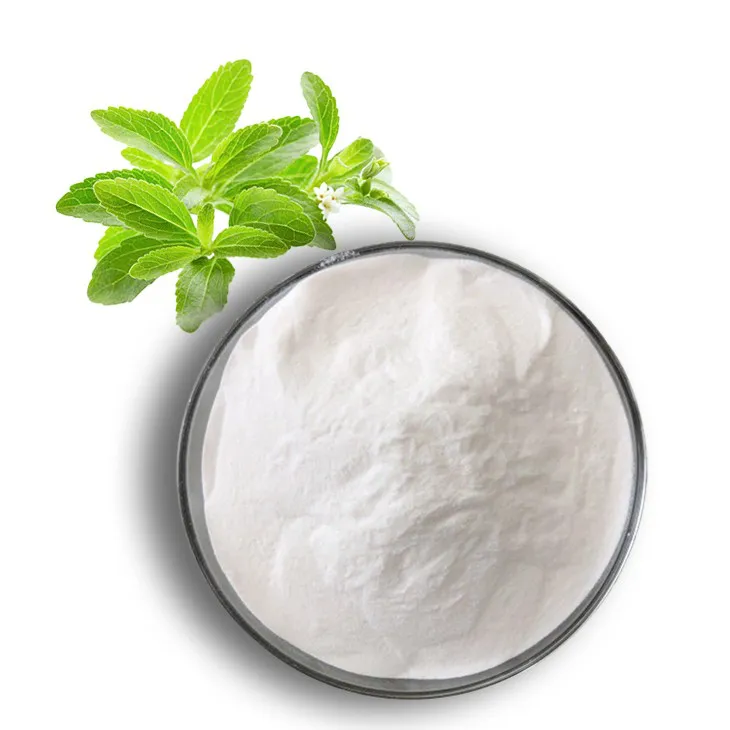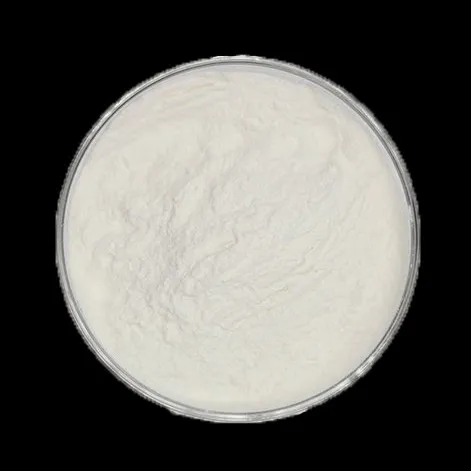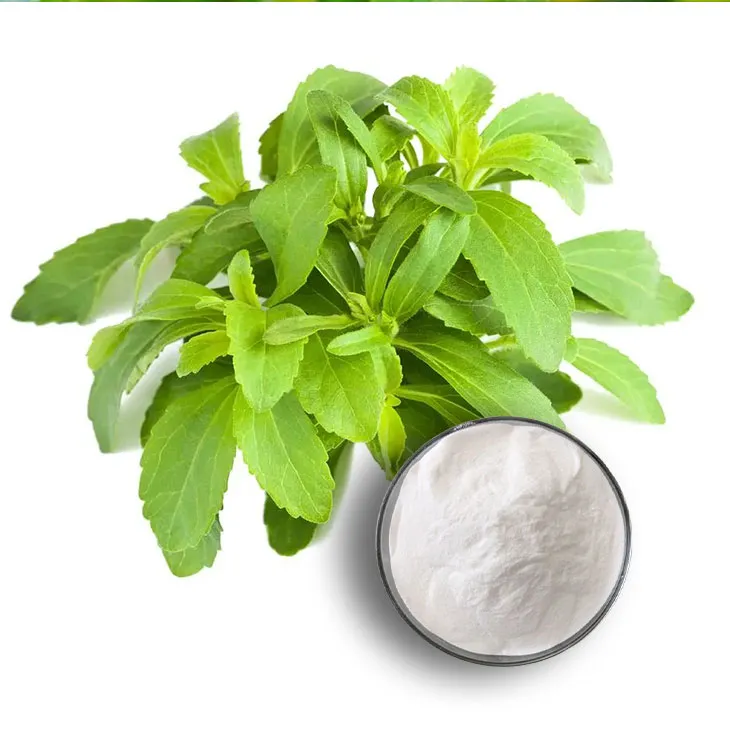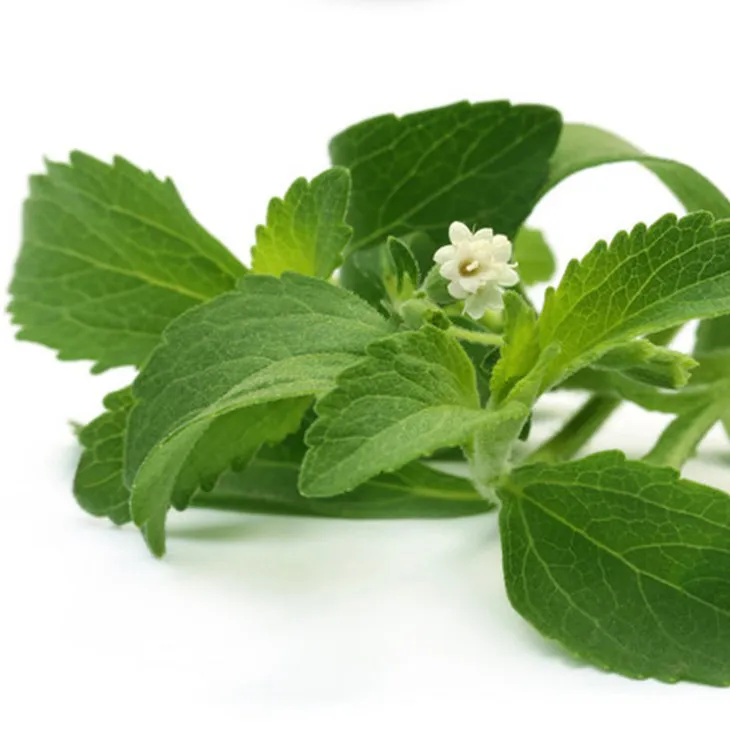- 0086-571-85302990
- sales@greenskybio.com
Manufacturer of Organic Stevia Extract Powder.
2024-11-27

Introduction to Organic Stevia Extract Powder Manufacturers
Organic Stevia Extract powder manufacturers play a crucial role in today's food and beverage industry. They are at the forefront of providing a natural alternative to artificial sweeteners. Stevia, a plant with a long history, has been used for centuries due to its sweet - tasting leaves. For manufacturers, stevia serves as the fundamental source material.

The Manufacturing Process
Selection of Premium Organic Stevia Plants
The manufacturing process of organic Stevia Extract powder is a complex and precise operation. It all starts with the careful selection of premium organic stevia plants. These plants need to be grown in optimal conditions to ensure high - quality leaves. Organic farming practices are strictly adhered to, which means no use of synthetic pesticides or fertilizers. This not only guarantees the purity of the final product but also aligns with the growing consumer demand for organic products.
Harvesting and Initial Processing
Once the stevia plants have reached the appropriate stage of growth, they are harvested. After harvesting, the leaves are immediately processed. The initial processing involves cleaning the leaves thoroughly to remove any dirt or debris. This is a critical step as any contaminants left on the leaves could affect the quality of the extract powder.
Advanced Extraction Methods
The heart of the manufacturing process lies in the state - of - the - art extraction methods. Manufacturers use techniques to isolate the glycosides, which are responsible for the sweet taste of stevia. These extraction methods are carefully designed to ensure maximum yield while maintaining the integrity of the active compounds. Some of the common extraction techniques include solvent extraction and supercritical fluid extraction.
-
Solvent extraction: In this method, a suitable solvent is used to dissolve the glycosides from the stevia leaves. The choice of solvent is crucial as it needs to be safe for consumption and effective in extracting the desired compounds. After extraction, the solvent is removed through a series of purification steps to obtain the pure stevia extract powder.
-
Supercritical fluid extraction: This is a more advanced technique that uses supercritical fluids, such as carbon dioxide, as the extraction medium. Supercritical fluids have unique properties that make them ideal for extracting delicate compounds like stevia glycosides. This method is often preferred for its ability to produce a high - quality extract with minimal residue.
Post - extraction Processing
After the extraction of the glycosides, the resulting stevia extract may undergo further processing. This can include steps such as drying to convert the liquid extract into a powder form. Drying methods need to be carefully controlled to prevent any degradation of the active compounds. Additionally, sieving and milling may be carried out to achieve the desired particle size and consistency of the stevia extract powder.

Product Innovation in the Market
The market for organic stevia extract powder is highly competitive. To gain a competitive edge, manufacturers are constantly focusing on product innovation.
Specialized Forms of Stevia Extract Powder
Manufacturers are developing different specialized forms of stevia extract powder. One such form is the highly soluble stevia extract powder. This is particularly useful in applications where quick dissolution is required, such as in instant beverages. Another innovation is the development of stevia extract powder with a low - aftertaste. Stevia has been known to have a slightly bitter aftertaste in some cases, and manufacturers are working hard to reduce this through various processing techniques and formulation strategies.
-
For the highly soluble stevia extract powder, manufacturers may modify the particle size and surface properties of the powder. This can be achieved through techniques like micronization, which reduces the particle size to a very fine level, increasing the surface area and thus the solubility.
-
To address the aftertaste issue, some manufacturers are exploring the use of different combinations of stevia glycosides. By carefully selecting and blending specific glycosides, they can create a more balanced and pleasant - tasting stevia extract powder.
Collaboration with Food and Beverage Companies
Another aspect of product innovation is the collaboration with food and beverage companies. Manufacturers work closely with these companies to create custom solutions. For example, in the development of a new diet soda, the stevia extract powder manufacturer can work with the beverage company to determine the optimal amount of stevia extract to use, taking into account factors such as taste, sweetness intensity, and cost. This collaboration also extends to the development of new product formulations that incorporate stevia extract powder in unique ways, such as in baked goods or dairy products.

Compliance with Regulatory Requirements
In the production of organic stevia extract powder, compliance with regulatory requirements regarding organic production and food safety is of utmost importance.
Organic Production Standards
Manufacturers must adhere to strict organic production standards. These standards govern every aspect of the stevia plant cultivation, from the type of soil used to the methods of pest control. For example, in the United States, manufacturers need to follow the USDA Organic standards. This includes requirements such as maintaining proper separation between organic and non - organic crops, keeping detailed records of all farming activities, and undergoing regular inspections by accredited certifying agencies.
Food Safety Regulations
Food safety is another critical area of compliance. The stevia extract powder must meet all relevant food safety regulations, which cover aspects such as microbiological safety, heavy metal limits, and purity standards. Manufacturers need to implement strict quality control measures throughout the production process. This includes regular testing of raw materials, in - process samples, and the final product. Any non - compliance can lead to serious consequences, including product recalls and damage to the company's reputation.

The Market Outlook for Organic Stevia Extract Powder Manufacturers
As consumer trends shift towards healthier and more natural products, the future looks bright for organic stevia extract powder manufacturers.
Increasing Demand for Clean - label and Natural Products
The demand for clean - label and natural products is on the rise. Consumers are becoming more conscious of what they put into their bodies and are actively seeking products that are free from artificial additives. Organic stevia extract powder fits perfectly into this trend as it is a natural sweetener. This increasing demand provides a great opportunity for manufacturers to expand their market share and introduce new products.
Potential for Expansion in Different Industries
Organic stevia extract powder has the potential to be used in a wide range of industries. Besides the traditional food and beverage industry, it can also find applications in the pharmaceutical and cosmetic industries. In the pharmaceutical industry, stevia extract powder can be used as a sweetener in oral medications, especially for those targeting diabetic patients. In the cosmetic industry, it can be used in products such as lip balms and toothpaste as a natural sweetening agent. This potential for expansion into different industries offers manufacturers new avenues for growth and diversification.
FAQ:
What are the key steps in manufacturing organic stevia extract powder?
The key steps start with the selection of premium organic stevia plants. After harvesting, the leaves are processed using advanced extraction methods to isolate the glycosides that give the sweet taste.
How do organic stevia extract powder manufacturers compete in the market?
They compete by focusing on product innovation. For example, they develop specialized forms like highly soluble or low - aftertaste varieties. Also, they collaborate with food and beverage companies to create custom solutions.
Why is compliance with regulations important for these manufacturers?
Compliance with regulatory requirements regarding organic production and food safety is crucial because it ensures that consumers can trust the products.
What makes stevia a good source for a natural sweetener alternative?
Stevia is an ancient plant with sweet - tasting leaves. Its natural origin makes it a good alternative to artificial sweeteners.
How do manufacturers ensure the quality of organic stevia extract powder?
They start with high - quality organic stevia plants. During the manufacturing process, they use state - of - the - art extraction techniques. Also, compliance with regulations helps in ensuring the quality.
Related literature
- Organic Stevia: Cultivation and Extraction Processes"
- "The Role of Organic Stevia Extract in the Food Industry"
- "Quality Control in Organic Stevia Extract Powder Manufacturing"
- ▶ Hesperidin
- ▶ Citrus Bioflavonoids
- ▶ Plant Extract
- ▶ lycopene
- ▶ Diosmin
- ▶ Grape seed extract
- ▶ Sea buckthorn Juice Powder
- ▶ Fruit Juice Powder
- ▶ Hops Extract
- ▶ Artichoke Extract
- ▶ Mushroom extract
- ▶ Astaxanthin
- ▶ Green Tea Extract
- ▶ Curcumin
- ▶ Horse Chestnut Extract
- ▶ Other Product
- ▶ Boswellia Serrata Extract
- ▶ Resveratrol
- ▶ Marigold Extract
- ▶ Grape Leaf Extract
- ▶ New Product
- ▶ Aminolevulinic acid
- ▶ Cranberry Extract
- ▶ Red Yeast Rice
- ▶ Red Wine Extract
-
Passionflower Extract
2024-11-27
-
Bilberry Extract
2024-11-27
-
Plantain extract
2024-11-27
-
Milk Thistle Extract
2024-11-27
-
Longan Extract
2024-11-27
-
Angelica sinensis extract
2024-11-27
-
Natural grape seed extract
2024-11-27
-
Almond Extract Powder
2024-11-27
-
Echinacea Extract
2024-11-27
-
Cat Claw Extract
2024-11-27





















